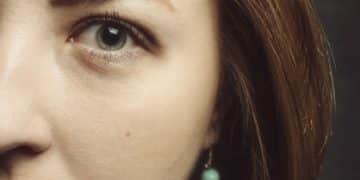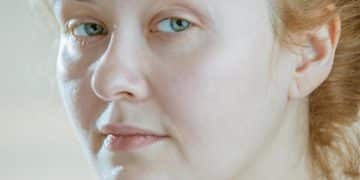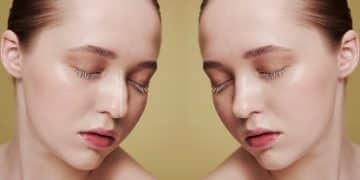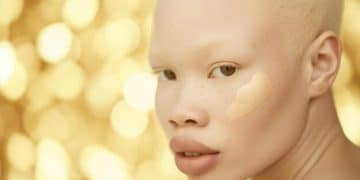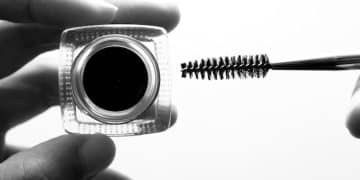The Complete Guide to Acne Treatment and Prevention in Your 20s, 30s, and Beyond
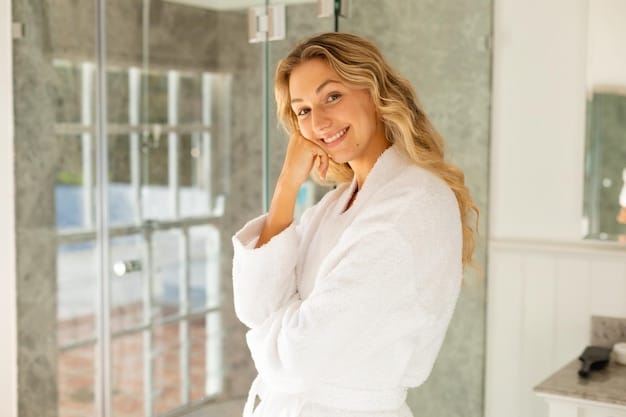
Acne, a common skin condition affecting people of all ages, requires a comprehensive understanding of its causes, triggers, and treatments to effectively manage it in your 20s, 30s, and beyond, promoting clearer and healthier skin throughout adulthood.
Navigating the world of acne can feel like a never-ending battle, especially when it persists through your 20s, 30s, and even beyond. This the complete guide to understanding and treating acne in your 20s, 30s, and beyond will delve into the causes, treatments, and preventative measures you can implement to achieve clearer, healthier skin at any age.
Understanding Acne: More Than Just a Teenage Problem
Acne is often thought of as a teenage issue, but it can affect people of all ages. Understanding the root causes of acne is the first step toward effective treatment. Factors like hormones, genetics, and lifestyle choices all play a significant role.
Hormonal Imbalances
Hormonal fluctuations are a primary cause of acne, especially in women. These imbalances can lead to increased sebum production, which clogs pores and creates an environment conducive to bacterial growth.
Genetic Predisposition
Genetics can also determine your susceptibility to acne. If your parents experienced severe acne, you are more likely to develop it as well. Understanding your family history can help you anticipate and manage potential outbreaks.
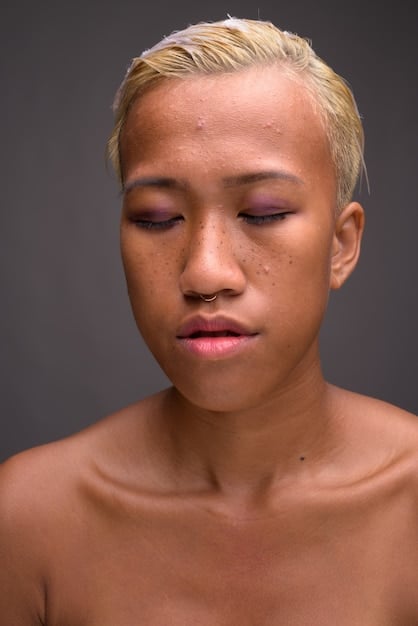
Lifestyle Factors
Certain lifestyle factors, such as diet and stress levels, can exacerbate acne. A diet high in processed foods and sugars can trigger inflammation, while stress can lead to hormonal imbalances.
- Balanced Diet: Focus on whole foods, including fruits, vegetables, and lean proteins.
- Stress Management: Incorporate stress-reducing activities like yoga, meditation, or regular exercise.
- Hydration: Drink plenty of water to keep your skin hydrated and support overall health.
- Proper Skincare: Use gentle, non-comedogenic skincare products to avoid clogging pores.
By understanding these underlying factors, you can begin to tailor your acne treatment to address the specific causes affecting your skin.
Acne in Your 20s: A Transitioning Phase
Your 20s often bring significant lifestyle changes, which can impact your skin. From career pressures to evolving social habits, it’s crucial to adapt your skincare routine to meet these new challenges.
Career Stress
The pressures of starting a career can lead to increased stress levels, which in turn trigger acne. Managing stress during this phase is crucial for maintaining clear skin.
Changing Social Habits
Social activities in your 20s might include more alcohol consumption and late nights, both of which can affect your skin. Moderation and proper skincare are key to minimizing these effects.
Skincare Essentials for Your 20s
Establishing a consistent skincare routine is essential in your 20s. This includes cleansing, exfoliating, and moisturizing to keep your skin healthy and balanced.
- Gentle Cleansing: Use a mild cleanser to remove dirt and oil without stripping your skin.
- Regular Exfoliation: Exfoliate 1-2 times per week to remove dead skin cells and prevent clogged pores.
- Hydration: Use a lightweight, non-comedogenic moisturizer to keep your skin hydrated.
- Sun Protection: Apply sunscreen daily to protect your skin from sun damage.
Addressing these lifestyle and skincare considerations can help you maintain clear and healthy skin throughout your 20s.
Acne in Your 30s: Understanding Adult-Onset Acne
Acne in your 30s can be particularly frustrating, especially if you thought you had left it behind in your teenage years. Adult-onset acne often has different causes and requires a tailored approach to treatment.
Hormonal Shifts
Hormonal changes, such as those related to pregnancy or hormonal birth control, can trigger adult-onset acne. Consulting with a healthcare provider can help you manage these shifts.
Stress and Lifestyle
The demands of career and family life in your 30s can lead to chronic stress, contributing to acne. Mindfulness and stress-reduction techniques are valuable tools.
Product Overload
Using too many skincare products or harsh ingredients can irritate your skin and worsen acne. Simplifying your routine and choosing gentle products can be beneficial.
By understanding the unique challenges of acne in your 30s, you can take targeted steps to manage and treat it effectively.
Effective Acne Treatments: A Comprehensive Overview
There are numerous acne treatments available, ranging from over-the-counter options to prescription medications. Understanding the various options and their effectiveness is vital for choosing the right solution.
Over-the-Counter Treatments
Over-the-counter treatments typically contain ingredients like benzoyl peroxide, salicylic acid, and glycolic acid. These can be effective for mild to moderate acne.
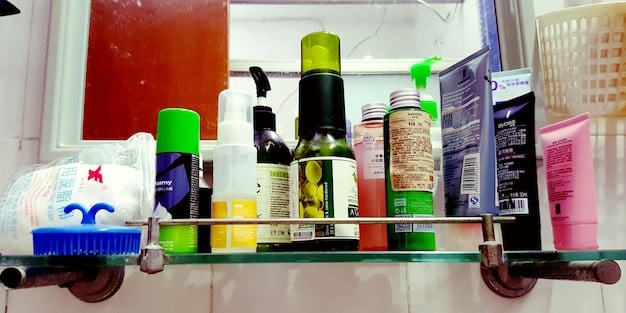
Prescription Medications
For more severe acne, prescription medications like retinoids, antibiotics, and hormonal therapies may be necessary. These require a consultation with a dermatologist.
Professional Treatments
Professional treatments such as chemical peels, microdermabrasion, and laser therapy can provide significant improvements in acne and scarring. These are typically performed by a dermatologist or licensed aesthetician.
- Topical Retinoids: Promote cell turnover and prevent clogged pores.
- Oral Antibiotics: Reduce inflammation and kill acne-causing bacteria.
- Hormonal Therapies: Regulate hormone levels to reduce sebum production.
- Chemical Peels: Exfoliate the skin and reduce acne lesions.
Consulting with a dermatologist is crucial for determining the most appropriate treatment plan based on your specific skin type and acne severity.
Preventative Measures: Long-Term Strategies for Clear Skin
Preventing acne is just as important as treating it. Implementing long-term strategies can help you maintain clear skin and minimize future outbreaks. Consistency and a holistic approach are key.
Consistent Skincare Routine
Maintaining a consistent skincare routine, tailored to your skin type, is essential for preventing acne. This includes cleansing, exfoliating, moisturizing, and sun protection.
Healthy Diet
A balanced diet rich in fruits, vegetables, and lean proteins can support overall skin health and reduce inflammation. Avoiding processed foods and sugary drinks is also beneficial.
Stress Reduction Techniques
Incorporating stress-reduction techniques such as yoga, meditation, or deep breathing exercises can help manage hormonal imbalances and prevent stress-related acne.
By adopting these preventative measures, you can create a long-term strategy for maintaining clear and healthy skin throughout your life.
Lifestyle Adjustments: Small Changes, Big Impact
Making small adjustments to your lifestyle can have a significant impact on your skin health. Simple changes in your habits can reduce acne and promote a clearer complexion.
Proper Hydration
Drinking plenty of water helps keep your skin hydrated and flushes out toxins. Aim for at least eight glasses of water per day.
Regular Exercise
Regular physical activity can improve circulation and reduce stress levels, both of which benefit your skin. Choose activities you enjoy and incorporate them into your routine.
Sleep Hygiene
Getting adequate sleep is crucial for skin health. Aim for 7-8 hours of sleep per night to allow your skin to repair and rejuvenate.
- Limit Makeup: Reduce the use of heavy makeup products that can clog pores.
- Clean Makeup Brushes: Regularly clean your makeup brushes to prevent bacterial buildup.
- Avoid Touching Your Face: Minimize touching your face to avoid transferring dirt and oil.
- Use Non-Comedogenic Products: Choose skincare and makeup products that are labeled as non-comedogenic.
Incorporating these lifestyle adjustments can complement your skincare routine and significantly improve your skin’s overall health and appearance.
| Key Point | Brief Description |
|---|---|
| 😊 Consistent Skincare | Maintain a daily routine of cleansing, exfoliating, and moisturizing. |
| 🥗 Healthy Diet | Focus on fruits, vegetables, and lean proteins, avoiding processed foods. |
| 💧 Proper Hydration | Drink at least eight glasses of water daily to keep skin hydrated. |
| 💪 Stress Management | Incorporate stress-reduction techniques like yoga or meditation. |
Frequently Asked Questions (FAQ)
What causes acne in my 30s?
▼
Acne in your 30s can be caused by hormonal fluctuations, stress, lifestyle factors, and the use of certain skincare products. It’s often referred to as adult-onset acne.
▼
Acne in your 30s can be caused by hormonal fluctuations, stress, lifestyle factors, and the use of certain skincare products. It’s often referred to as adult-onset acne.
▼
Managing stress involves incorporating relaxation techniques such as yoga, meditation, or deep breathing exercises into your daily routine. These can help regulate hormone levels.
▼
A good skincare routine includes gentle cleansing, regular exfoliation, hydration with a non-comedogenic moisturizer, and daily sun protection. Tailor the routine to your specific skin type.
▼
Yes, a balanced diet rich in fruits, vegetables, and lean proteins can help. Avoid processed foods, sugary drinks, and dairy products, as they can exacerbate acne.
▼
You should see a dermatologist if over-the-counter treatments are not effective, if you have severe or cystic acne, or if you experience scarring. They can provide prescription medications.
Conclusion
Acne can be a persistent issue in your 20s, 30s, and beyond, but with the right knowledge and strategies, it can be effectively managed. By understanding the causes, implementing a consistent skincare routine, making lifestyle adjustments, and seeking professional help when needed, you can achieve clearer, healthier skin at any age.
